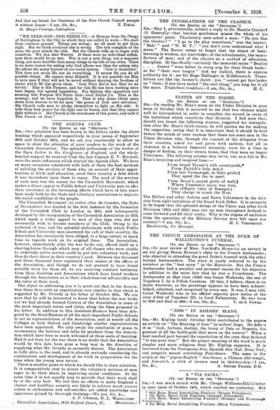THE AGENDA CLUB.
[To THE EDITOR OF THE " SPECTATOR.""
Sut,—Our attention has been drawn to the letters under the above heading which appeared respectively in your issues of September 30th and October 28th, and we ask you courteously to allow us space to draw the attention of your readers to the work of the Cavendish Association. The splendid enthusiasm of the writer of the Open Letter to the Gentlemen of England, and the whole- hearted support he received from the late Captain E. V. Birchall, were the main influences which started the Agenda Club. We have on many occasions considered with both of them the best methods of enlisting the services of those who, on account of their oppor- tunities of birth and education, owed their country a debt which it was incumbent upon them to repay. The need of the services of such men was the reason for the Cavendish Movement, which makes a direct appeal to Public School and University men to offer their assistance in the increasing efforts which have of late years been made both by the State and voluntary associations to improve the social conditions of the people.
The Cavendish Movement (so called after its founder, the Duke of Devonshire) was started in the first instance by the formation of the Cavendish Club in London in 1911, and subsequently developed by the inauguration of the Cavendish Association in 1913, .which made a wider appeal to men of this type who did not necessarily wish to become members of the Club. Owing to the outbreak of war, and the splendid enthusiasm with which Public School and University men answered the call of their country, the Association has necessarily been obliged, to a large extent, to n;iark time as regards work on its original lines. The Association, however, immediately after the war broke out, offered itself as a clearing-house through which men of all classes who were unable to undertake active service could be put into voluntary work, and thus do their share in their country's need. Between two thousand and three thousand have registered their names at the offices of the Association, and though we do not pretend to have found suitable work for them all, we are receiving constant testimony from those Societies and Associations which have found workers through the Association as to their whole-hearted self-sacrifice and the value of their work.
Our object in addressing you is to point out that in the Associa: tion there does exist an organization very similar to that which is suggested by Mr. Grundy in his letter of October 28th. We are sure that he will be interested to know that before the war broke out we had already formed Centres of the Association in some of the most important towns and cities, along the lines proposed in his letter. In addition to this Assistant-Masters have been dele- gated by the Head-Masters of all the most important Public Schools to act as representatives of the Association, and at nearly all the Colleges at both Oxford and Cambridge similar representatives have been appointed. We only await the conclusion of peace to recommence the lectures and talks by speakers from the Associa- tion which have been so much welcomed at these seats of learning. Had it not been for the war there is no doubt that the Association would by this date have gone a long way in the direction of supplying what Mr. Grundy so earnestly desires. The Association is fully alive to the need, and is already seriously considering the continuation and development of its work in preparation for the time when the young men return.
There is another point to which we should like to draw attention. It is comparatively easy to secure the voluntary services of man eager to do their share in improving social conditions. At the same time it is not equally easy to provide that their work shall be of the very best. We feel that no efforts to make England a cleaner and healthier country are likely to achieve much success unless to enthusiasm and self-sacrifice are added knowledge and experience gained by thorough training.—We are, Sir, &c., A. P. CHARLES, H. L. WoouicomBE Cavendish Association, 19-23 Oxford Street, W. (Secretaries.)














































 Previous page
Previous page